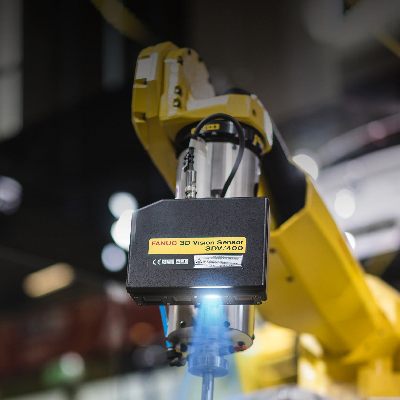
The new sensor differs from the 3DV/400 version initially introduced last year as it has an extended field of vision. Both sensors are almost identical, together with the 2D Camera Package, 3D Laser Sensor and 3D Area Sensor constitute a highly-integrated, high-performance portfolio for the industrial practice of image processing.
The 3DV/600 is an additional sensor designed for industrial use and extends FANUC’s practical and beginner-friendly image processing system. Both 3DV sensors can be permanently fitted in a system or installed on the last axis (axis 6) of a robot. In addition, several sensors can be used in combination on a robot. For example, a robot can be fitted with one sensor and one or more permanent sensors.
The 3D Vision Sensor can be used in multiple applications, including traditional applications such as bin picking, when feeding an assembly line or in logistics when stacking pallets or transport crates.
Due to a high level of integration and the very short image processing, the 3DV Sensors can also be combined with the iRPickTool on a conveyor belt, whereby the robot can be used during line tracking to pick all parts in a precise position and location. These include not only clearly geometrically defined parts or goods with properly defined gripping points, but also irregularly shaped products such as sacks, bags or foodstuffs. All kinds of products packaged in bags or sacks (e.g. foodstuff, hygiene products, animal feed or liquids) can therefore also be gripped selectively and securely, as FANUC-tested applications have shown. FANUC supports inexperienced customers with feasibility studies, to ease their first steps into robot-assisted image processing. To ensure the optimal development of further task fields, it is expected that the 3DV Sensor Series will be further expanded in the near future.
The 3DV Sensor is pre-calibrated ex-works, which saves time when setting up and installing the system. After the sensor is installed, the robot simply has to identify the actual position of its "eyes". A setup-wizard supports and guides you through the necessary settings. The position information provided by the sensor is then directly usable for the robot.
The 3DV Sensor is directly connected with the robot control and provides image information that is processed by the robot CPU and transformed into a 3D point cloud. The direct connection between the 3D Sensor and robot CPU has several technical benefits:
- There is no interface development needed, as the FANUC 3D Sensor support is fully integrated into the robot software.
- Image acquisition and processing is at maximum speed.
- In the robot program, very easily parameters for controlling and evaluating the sensors can be used.
Additional benefit is the "3D-Snap-in-Motion function“. When in motion, the robot is able to trigger the snapping of an image – an advantage over non-integrated vision systems. As all images are captured in motion and without stopping the robot, a lot of time is saved in practice.
Another new function is the "Stitch Function“. This involves piecing together individual images to make a larger one (in terms of area) or to make a more complete 3D point cloud. Accordingly the stitch function can be used
- whenever a larger field of vision is required, such as is typically the case with large pallets for example,
- and whenever a complete, rather than incomplete 3D image is required for image analysis, such as is typically the case with optically or geometrically challenging objects in the normal field of vision of the 3DV Sensor.
Both 3D Vision Sensors, 3DV/400 and 3DV/600, are equipped with blue LED lighting as standard and connected with a single cable. An advantage of the "one-cable solution" is that when it's used with the FANUC 2D Camera Package, the user does not have to work with different cables or connectors. The camera is supplied with power, images are transmitted and LED lighting is adjusted via this one cable.
Onwards with Artificial Intelligence
And can artificial intelligence (AI) now optimise image processing application? As technology leader, FANUC’s answer is clear: Yes, it can. Artificial intelligence is set to become a key technology in image processing. Artificial intelligence is expected to develop further beyond its current status. AI functions will be expected to identify parts, reduce error rates and solve non-programmable gripper tasks. FANUC has taken an initial step in connection with Deep Learning with its bin picking task solution.
NIKE SB













